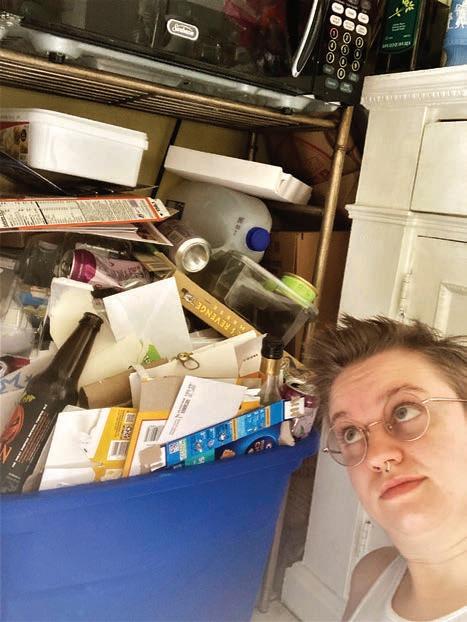
2 minute read
Waste No More will bring access to compost and recycling in Denver
Denver residents see any changes.
BY ELICIA HESSELGRAVE SPECIAL TO COLORADO COMMUNITY MEDIA
Bex Schmelzel is looking forward to the day that Recycle Island will no longer take over the tiny kitchen in their Capitol Hill apartment.
Schmelzel’s apartment building does not provide recycling. Recycle Island is what Schmelzel and their partner call the pile of recyclables they store until a friend — who works at a recycling center in Boulder — can pick up the recyclables and drop them o .
“It’s such a relief when we can get rid of it,” Schmelzel said.
ey added that when there are months that go by before the friend is able to help with their recyclables, Recycle Island has, at times, reached about two-by-two feet or more.
“I don’t like the idea of being wasteful,” Schmelzel said. “I literally feel bad in my heart for being wasteful.”

Denver is on the path to ‘Waste No More’ Ean Tafoya, a candidate for mayor who served as co-director of the Waste No More campaign, and his colleagues worked on the measure for two years. In 2016, Tafoya was petitioning for the Denver Green Roof Initiative — which voters passed in 2017 and is now known as the Green Buildings Ordinance — when he discovered that Denver residents actually had a greater interest in access to recycling.
So, he and a team went to work to start writing the Waste No More initiative in 2020 and collected more than 11,000 signatures to get Waste No More on the ballot. ey missed the deadline for the 2021 election, but knowing Denver residents cared about access to recycling, Tafoya and his team continued their work to ensure it was on the November 2022 ballot.
“ ere has been a delay in (the) climate action that science is asking for, and my generation is crying for,” Tafoya said. “It is clear from the vote of the Denver public, this is what we want.” ankfully for Schmelzel, Ballot Measure 306, known as Waste No More, passed in November with nearly a 71% yes vote. is law requires all buildings in Denver, like Schmelzel’s apartment building, to provide access to recycling.
Bex Schmelzel will be glad when Waste No More will be implemented so that their Recycle Island will be a thing of the past. Schmelzel’s apartment in Denver currently does not o er recycling, so sometimes Recycle Island can pile up to two-by-two feet or more before a friend is able to pick up the recyclables and drop them o at a recycling center.
To learn more about the Waste No More Implementation Task Force, visit tinyurl.com/TaskForce-WasteNoMore. Deadline to apply to serve on the task force was Jan. 27, but the webpage has a meeting schedule, which are open to the public.
But until Schmelzel’s apartment complex starts o ering recycling, there’s little that they can do except let Recycle Island pile up. Schmelzel works at a school and is attending graduate school at the University of Denver so they are not able to a ord other sustainable options such as re ll shops.
Schmelzel hopes the Waste No More initiative will reframe how people think about recycling.
“It’s a good measure,” they said. “We want to be able to recycle.”
Still, it could be a number of months before e city of Denver is making strides to improve its diversion rate and Waste No More will play a big role.
He added that Waste No More has the potential to make a signi cant impact on the local environment.
According to the most recent numbers available, Denver is sending about 75% of its waste to land ll. ese numbers, which are from 2021, demonstrate that Denver’s diversion rate — the amount of material that is not sent to land ll — is at 25.7%. For comparison, the Boulder County Sustainability website reports its diversion rate is 35%, and the 2021 Fort Collins Waste Reduction & Recycling Report states its diversion rate was 55.5% for that year.








